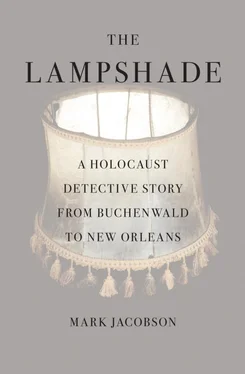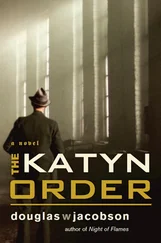“People talk about a post-racial society. You might as well call it a post-human society, because race is the natural order of things. It dictates behavior. Tell me, do you think if you had twenty thousand Anglo-Saxons in the Superdome, you would have had people acting like that? Twenty thousand Germans, twenty thousand Danish or Swedish people? You think any of that would have happened?”
There was every chance the entire American enterprise was going to go the way of New Orleans, Duke said. The white Europeans who had founded the country, built it into a great nation, were getting the short end of the stick.
He related the situation to his own criminal conviction. “They had nothing on me. The whole thing was going to be dropped. But then I made an appearance on Al-Jazeera talking about how the Iraq War was about nothing but Zionist domination of American foreign policy. It wasn’t a war about oil. It was a war about what Israel wants. A war dictated by Israel. Dictated by Israel to the American president. That’s what I said to an audience of ten million. I guess some Zionist in the State Department must have heard it and asked around, ‘What do we have on Duke?’ Then, the next thing I know, I’m arrested, facing something like twenty years in jail with the threat of an all-black jury hanging over my head. So I took the plea. I didn’t want to, but I did. That’s what happens to people who speak out against the real power structure.”
Duke had been talking for going on two hours. He’d missed his date to photograph the sunset, but no matter. The sun would go down tomorrow, too. He had a lot more to say, an anxious, even desperate need to explain himself to this Jew who dutifully wrote down most everything he said in a skinny reporter’s notebook. It was “good to talk to a Jewish man who likes to listen,” Duke said.
Which was true. There was a strange comfort in hearing Duke spin out these moth-eaten theories, these conjectures about how my people (not me, of course, but my people) were the true power behind Bush and every other asshole currently wrecking the world. After encountering the anti-antifa in Weimar, those inscrutable black-clad figures harboring who knew what newer and more opaque kind of “Ossie” fascism in their hearts, here, at least, was the Nazi I knew.
I wouldn’t say I felt sorry for him, but Duke did have a seriously hangdog aspect. It seemed a sad Dick Shawn act, shacking up in this college party resort in such close proximity to the Berchtesgaden mother lode. Was he so friendless in his secret Aryan Valhalla that he didn’t even mind opening up to a big-nosed Jew?
Duke became expansive. Did I know, for instance, that white people had settled the New World before the so-called Native Americans?
“It is called the ‘Solutrean hypothesis,’” Duke explained: “A professor at the Smithsonian Institute came up with it based on the arrowheads they’ve found. There is also a lot of genetic evidence, an overlapping between the DNA of European groups and skeletons found in America. All these years we’ve had to listen to how horrible the white race is. How much terrible stuff we’ve done. They say the white man wiped out the Indians. Well, here’s proof that it was actually the other way around.”
I asked him if he ever misses Louisiana.
“Well, I go back there a lot. I have no restraining order against me preventing it. And I do love it. I loved growing up there,” Duke said. “When we were kids, we’d string hooks with worms, dig for hearts of palm. We’d go out on little boats for days at a time. Swim with the gators. We all swam with the gators. Then you’d wake up early to see the sun rise over the water. I guess you can say I’m torn because as much as I love the bayou, I love the mountains, too. When I’m here I feel more religious than I ever have in the church. There’s so much strength in the landscape. But when it comes down to it, I’ll always be a Louisiana boy at heart.”
We’d bonded now, Duke and me. He gave me his personal number and told me to call whenever I “get a hankering.” There was only one thing left to discuss, the lampshade.
“Can’t talk about that,” Duke replied, his mood suddenly cold. “Nothing about the Holocaust.”
In the mongrelized USA, Duke could say whatever he wanted, but here in the cradle of National Socialist romance and idealism, there was no First Amendment. No license to say the first moronic thing that came into your head. It had only been a couple of years since the Austrian government had sentenced David Irving to three years in jail for maintaining there were no gas chambers at Auschwitz. If you were going to “talk politics,” as Duke called it, you’d better watch your mouth.
A flock of geese flew overhead. Duke looked up. “You can see eagles here, owl eagles,” he said, noting he’d like to do more photography of Alpine bird life. Then, leaning over, Duke lowered his voice. “Those lampshades are a myth. Everybody knows that.”

THIRTEEN

For twenty years, I thought the opening line of Bob Dylan’s “Blind Willie McTell” was “Seen the arrow on the dartboard, saying this land is condemned.” Then I found out that he’s really saying, “Seen the arrow on the doorpost …” The song was already one of Dylan’s most desolate, with that business about the “ghosts of slavery ships” and “power and greed and corruptible seed,” and the change only added to the bleakness. Since the next line, one I had right from the start, was “all the way from New Orleans to Jerusalem,” “Blind Willie McTell” became the mournful soundtrack to the few weeks before I boarded a plane to Ben Gurion Airport.
I saw the story of the lampshade breaking down into three parts: A) getting it, B) having it (the attempt to understand the history and the nature of the thing), and C) getting rid of it. I was up to C, or so I thought after speaking to renowned Holocaust scholar Yehuda Bauer. In contrast to other Holocaust professionals, Bauer, former director of the International Institute for Holocaust Research at the Yad Vashem Holocaust Martyrs, and Heroes, Remembrance Authority in Jerusalem, senior adviser to the International Forum on Genocide Prevention, and winner of the coveted Israel Prize, said he was more than willing to entertain the possibility that the lampshade might be real.
“Why shouldn’t I believe the Germans made lampshades out of Jews?” said the then eighty-three-year-old Bauer when I reached him in his Jerusalem office. When it came to atrocities, “I wouldn’t put anything past those people.”
Dr. Bauer had arrived in Palestine in 1939 after his family fled Prague, and he fought in the 1948 War of Independence. He and I had been emailing each other for a few weeks, and after receiving a copy of the Bode lab DNA report, he pronounced himself “officially intrigued” by the Katrina lampshade. “These colorful details you describe, with these oddball characters, seem unbelievable, but it is not unusual that such things like this lampshade might appear in the wake of upheavals,” the historian said. “In any disaster, and this New Orleans flood is certainly a disaster, the foundations and the framework of a time or place become shaken, causing strange things to wash up.”
Bauer was “not surprised” at my difficulties in getting a major Holocaust institution to take the lampshade off my hands. Holocaust institutions did a wonderful job in the preserving of memory and raising consciousness regarding genocide in general, he said, “but they were still institutions, given to institutional thinking.” This meant “fitting things into categories. I am not certain this lampshade of yours has a category.”
Читать дальше













